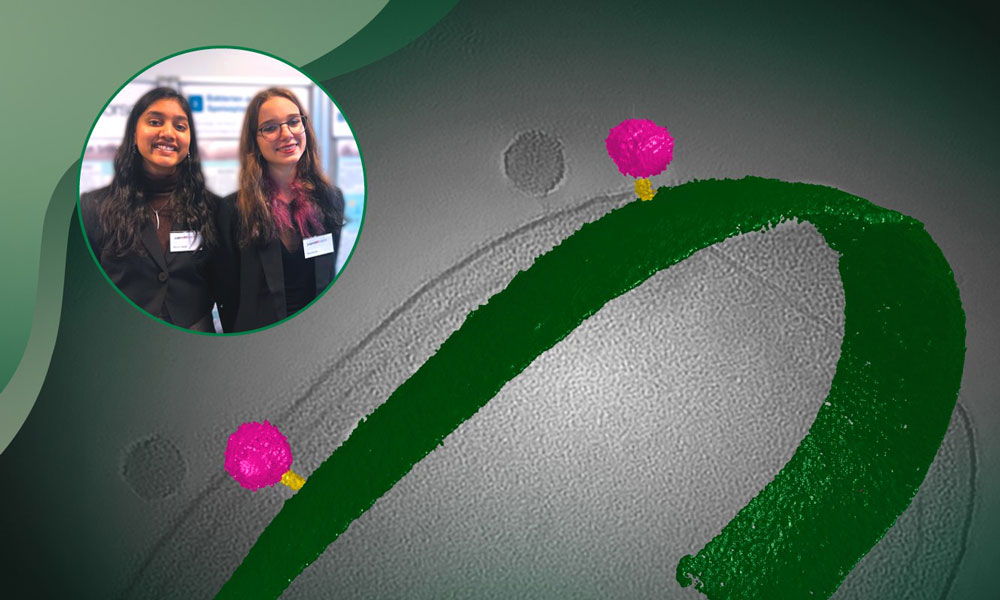Secondary school students Misha Hegde and Mia Maurer are investigating whether special viruses, called bacteriophages, can be used as biological pesticides against pathogenic bacteria in plants

A bacteriophage is a virus that can infect and destroy bacteria. Phages are highly specific, meaning that they only attack certain types of bacteria. For this reason, scientists are studying them as a possible alternative to antibiotics, particularly to combat antibiotic-resistant bacteria.
Misha Hegde and Mia Maurer are in years 9 and 10 at Schuldorf Bergstraße School in Seeheim-Jugenheim, Germany. For the past year and a half, the young researchers have been working on a targeted way to combat the plant pathogen Rhizobium rhizogenes. This bacterium causes hairy root disease, which can lead to the death of affected plants due to uncontrolled root growth, resulting in harvest losses.
In their search for a natural solution, Hegde and Maurer identified and isolated a previously unknown phage from compost soil, purified it, and tested its ability to target the bacterium. They found that the phage only attacked Rhizobium rhizogenes, without affecting beneficial microorganisms.
"It was an indescribable feeling to have achieved our goal after all this hard work - to find a host-specific phage against Rhizobium rhizogenes. I was full of euphoria," said Mia Maurer.
As a next step, the students plan to test the protective effect of their phage on carrot slices to see if it can actually prevent infection. In the long term, their approach could provide an environmentally friendly alternative to antibiotics in agriculture.
Cutting-edge services: EMBL supports student research on new phage
The European Molecular Biology Laboratory (EMBL) played a crucial role in Misha and Mia's research, particularly in the high-resolution imaging of their isolated phage.
At EMBL Heidelberg, the young researchers carried out scanning electron microscopy (SEM) at the Electron Microscopy Core Facility (EMCF) and cryo-electron tomography (cryo-ET) at the EMBL Imaging Centre . These advanced techniques allowed them to study the structure of their phage in detail and confirm that it has a short tail. This finding was key to classifying their phage within the family Podoviridae. With EMBL's expertise, they were able to produce high-resolution images that validated their findings and took their research forward.
The students are currently sequencing the DNA of their isolated phage to determine its exact genetic identity and confirm its taxonomic classification. To do this, they have already extracted and analysed the genetic material of both the phage and its host. So far, their tests have confirmed the phage's classification.
"Each new method has brought us one step closer to proving that this is a novel phage. Over the past year, we've really enjoyed learning new techniques in molecular biology and microbiology, as well as the theory behind them," said Misha Hegde.
The next step is to sequence the phage's entire genome at EMBL's Genomics Core Facility (GeneCore). The data obtained could provide evidence that their phage is indeed a new, previously undescribed species. In addition, the genetic information could help to understand the mechanism by which the phage attacks the pathogenic bacterium.
"We would like to thank Vladimir Benes, Simone Mattei, and Yannick Schwab, who were immediately willing to support our project when we contacted them, as well as their colleagues Rachel Mellwig, Viola Oorschot, Tobias Rausch, and Georg Wolff, who taught us so much about their work," said the two young scientists.
All set for the national 'Jugend forscht' competition
With their project 'Bacteria on the Menu 2.0', Hegde and Maurer recently won the young scientists competition ' Jugend forscht ' at a state level. They will compete in the national competition at the end of May.
The two students started their research in their school's MakerLab, which supports 30 projects across a range of academic disciplines. Here, students can independently develop creative solutions to research questions in physics, biology, chemistry, computer science, sensor technology or mechanical engineering. The MakerLab regularly competes successfully in the Young Scientists competition, and many of its graduates go on to scientific careers or university degrees.
"I'm delighted that Misha and Mia have stuck with this project through all the ups and downs," said Petra Leidert, Head of the Jugend forscht MakerLab at Schuldorf Bergstraße. "At the beginning, it was far from certain whether they would be able to find a specific phage within a reasonable timeframe - let alone complete the main part of their research, the characterisation, before the competition. And how often do students get the chance to discover a new organism?"






